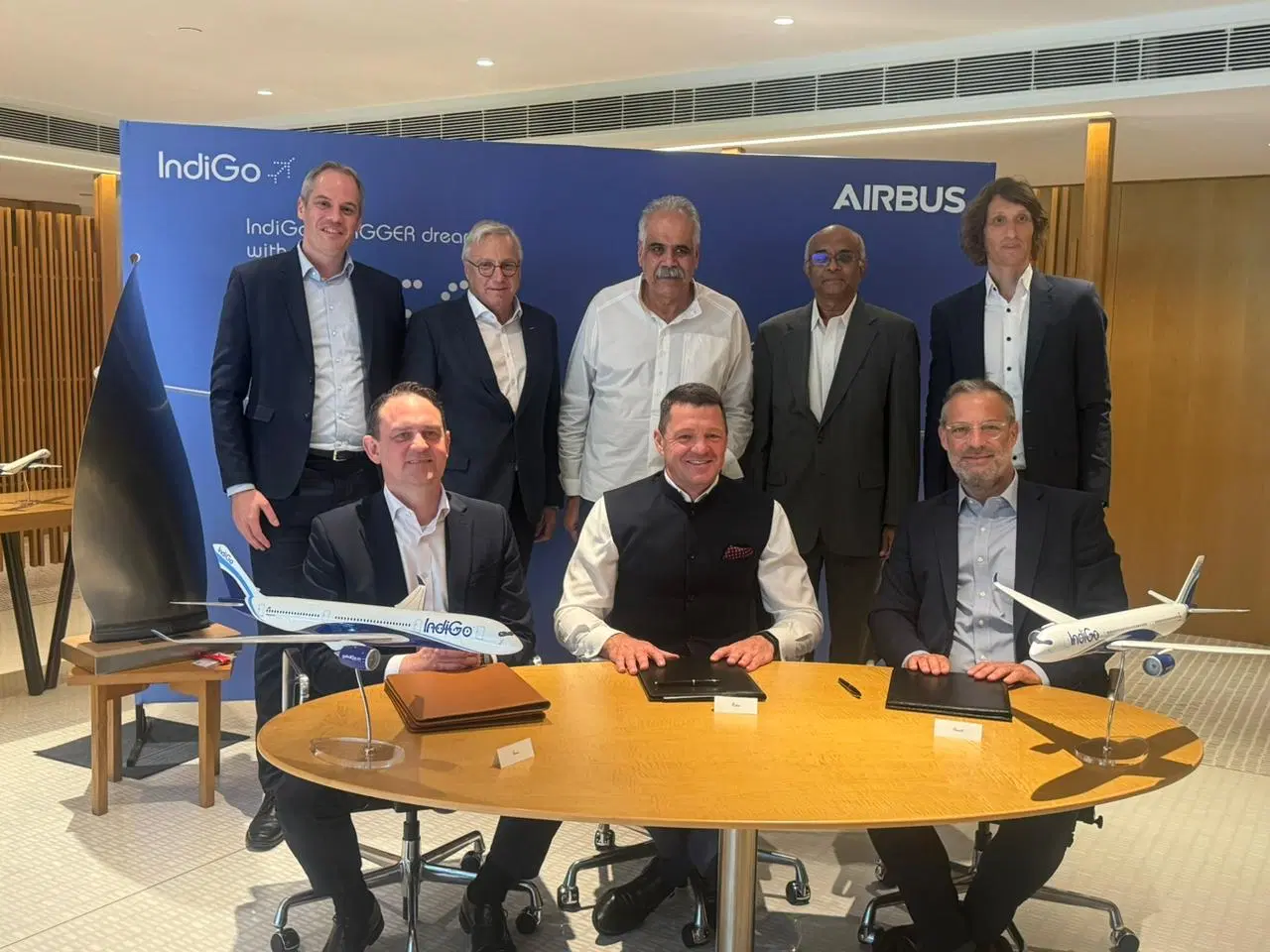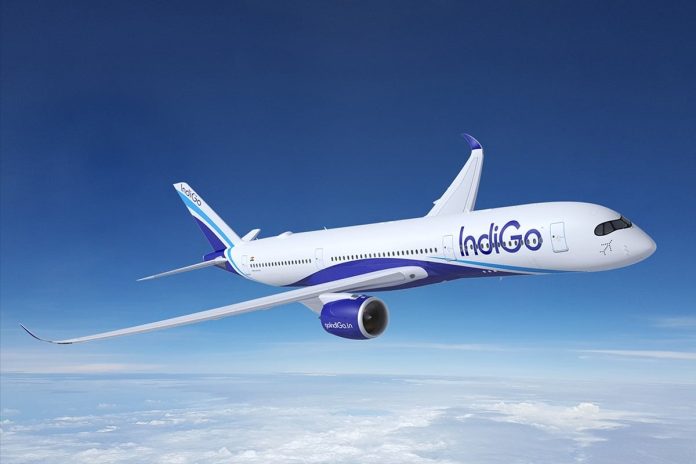- The Gurugram-based LCC has purchase rights for an additional 70 Airbus A350 family aircraft to meet possible future requirements.
Ending months of speculation, IndiGo’s announcement of a firm order for 30 Airbus A350-900 passenger aircraft has once again highlighted the potential for future growth in the world’s fastest-growing aviation market.
The acquisition will complement the Gurugram-headquartered low-cost carrier’s (LCC)’s humongous order for 500 planes inked at the 54th edition of the Paris Air Show in June last year.
The widebody aircraft are critical to IndiGo’s strategy of becoming a global mega-carrier by significantly launching international flights to long-haul destinations from India.
The airline’s Dutch CEO hinted as much in a statement shared with the media.
“[The] fleet of 30 Airbus A350-900 aircraft will allow IndiGo to embark on its next phase of becoming one of the leading global aviation players.”
The announcement also reiterates the Gurugram-headquartered carrier’s commitment to continue with an all-Airbus fleet. The airline, which currently has a fleet of B777 on a wet lease from Turkish Airlines, negotiated hard with both Europe’s Airbus and America’s Boeing for the best price.
No surprises here, as InterGlobe Group chairman and IndiGo co-founder Rahul Bhatia is known to be an amiable man but a tough negotiator. This has resulted in IndiGo enjoying some of the best discounts on its aircraft purchases globally.

“With the A350 selection, Indigo is now embarking on further opening the world to India. We will support the airline to take this pioneering and strategic step,” Benoit de Saint-Exupery, Airbus executive vice president of sales for commercial aircraft observed after getting yet another significant order from India.
Long-Haul Flights: Strategic Growth Area
Long-haul international flights have also emerged as a strategic growth area for market leaders IndiGo and Air India. The latter, which ordered 70 widebody planes from both Airbus and Boeing as part of its 470-aircraft mega order, took the delivery of the first A350-900 in December last year.
“Having covered the domestic market, Indian carriers now wish to conquer long-haul international routes. Such flights require widebodies. With the phenomenal growth in the aviation sector the world over, Indian carriers must not stay behind in claiming their share of the pie,” opines Ajay Kumar, managing partner at the law firm, KLA Legal.
“The contribution of Indian air carriers in international traffic originating in India has steadily been growing and is currently at 43 per cent. The current order of Indigo is to be seen in the context of operating long-haul flights. These are comparatively more profitable routes and open up avenues for innovative products coming out as Indian carriers offer good domestic connectivity,” declares Jagannarayan Padmanabhan, senior director at the advisory CRISIL Market Intelligence.
Following this announcement, India’s major scheduled airlines including Air India, IndiGo and Akasa Air have placed orders for 1,150 narrow and widebody passenger jets since February 2023.
It’s Just The Beginning
Per Airbus’ internal research given the projected upward growth of the Indian economy and the rapidly expanding aviation market in the world’s fifth-largest economy, this may just be the beginning. Indian carriers need around 3,000 aircraft and more than 80,000 trained pilots and technicians over the next two decades.
Besides, with Indians accounting for more than 10 million foreign trips, the country emerged as the largest source market for outbound travellers in Asia in 2022, overtaking China, South Korea and Japan.
A spectacular 190 per cent spike is projected for the segment year-on-year, according to a 2024 report released at ITB Berlin, the world’s largest gathering of the tourism trade.
And this is where widebody orders will have a role. They will allow enhanced international connectivity from not only major metros but also direct flights to London or Sydney from tier-2 and-3 cities like Lucknow and Amritsar amid the rapid urbanisation currently underway in India.
For instance, an A350-900 can accommodate around 400 passengers in a standard three-class configuration and fly non-stop on ultra-long-range routes of up to 18,000 km.
While IndiGo is yet to decide on the final seat configuration, deliveries are expected to commence in 2027. The airline also has purchase rights for an additional 70 Airbus A350 family aircraft to meet possible future needs.
Addressing A Historical Wrong
The widebody orders by Indian carriers are also expected to address a historical wrong. Bilateral air agreements inked with certain countries in the first decade of the century stunted the growth of both Indian carriers and airports, with Indian passengers forced to take connecting flights from airports in the Middle East or Southeast Asia.
Unhappy with this state of affairs, Jyotiraditya Scindia, Union Minister for Civil Aviation told this writer earlier that the acquisition of widebody planes by Indian carriers Air India and IndiGo would provide “point-to-point travel for our domestic flyers” on long-haul international routes. This would also help the country transform from being a feeder market to a major global aviation hub, he added.
In pursuit of its aatmanirbharta (self-reliance) agenda in aviation, the country has also refused to revise the bilateral rights to allow more flights by foreign carriers, a move that has been widely hailed by Indian carriers.
Understandably, the foreign carriers lobbying with the Indian government through some aviation think tanks aren’t very happy with this line of thinking and have even warned of similar restrictions being placed on operations by Indian carriers to their home markets.
Maintaining Leadership Position
Meanwhile, with competition heating up in the Indian aviation space, IndiGo’s latest order will help it stay ahead of the curve.
“For Indigo, to maintain its competitive edge, it would have had to diversify its fleet, and widebody Aircraft will allow the airline to compete in long-distance routes, attracting both leisure and business travellers,” avers CRISIL’s Padmanabhan.
Flying a fleet of 350 aircraft and commanding a market share of 60.5 per cent in March, IndiGo is India’s largest airline.
Also, following LCC GoFirst going belly up in May last year, the resulting acrimonious legal battle with lessors for the return of the aircraft has since cast a shadow on the country’s aviation sector.
“The Indian civil aviation market has been in the news for not-so-good reasons, primarily due to non-compliance with the Cape Town Convention and Protocol arising out of the GoFirst-related issues. The IndiGo order for the widebodies will help again send positive signals to the global lessor community,” says KLA Legal’s Kumar.
The announcement has certainly helped revive optimism in the market.


